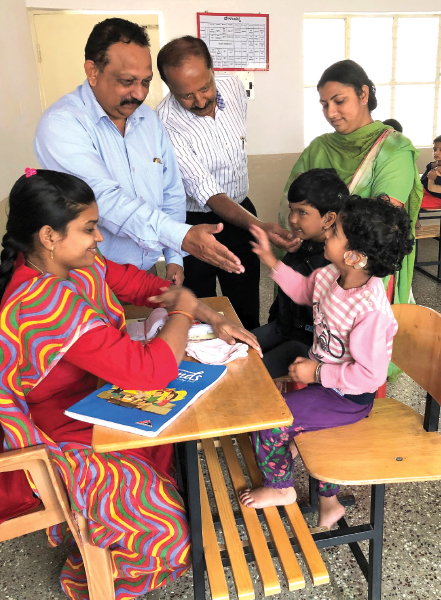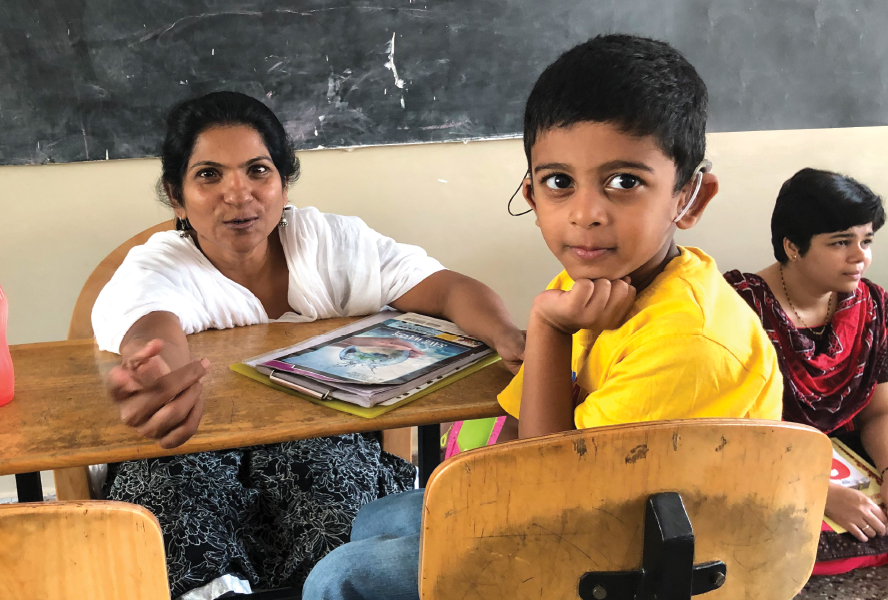RC Mysore West’s pioneering work for children with hearing loss
Now that you’ve been at this institution for 30 years, how many hearing-handicapped children have been integrated into regular schools, I ask Parimala Murthy, who heads the Rotary Mysore West Institute for Mother and Deaf Child in Mysuru.
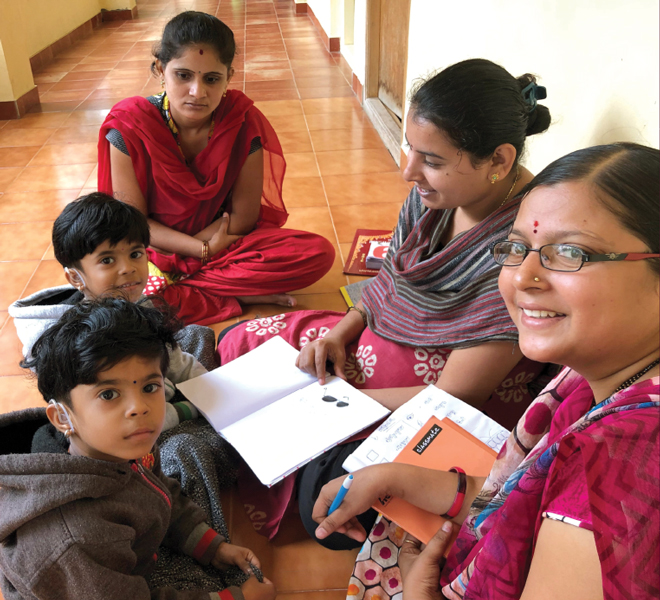
“Oh, that number is in thousands,” is her confident and enthusiastic reply.
Accompanied by RI District 3181 Governor Joseph Mathew and Reginald Wesley, President of RC Mysore West, which has been nurturing this project for long years, I visit the spacious campus of the institute, which both the Rotarians proudly point out, is probably the only one-of-its-kind in entire Asia. The facility is for early intervention and special training of hearing deficient children so that they can be integrated into regular schools. The classroom is both cheerful and colourful, and buzzing with energy, enthusiasm and vibrations that only places for children can generate.
Blindness separates people from things; deafness separates people from people.
– Helen Keller
We walk into the Kannada section — the institution offers facilities for mothers and children in Kannada, Hindi, Telugu, Malayalam and English — and find the place filled with bright colours and incessant chatter and laughter of children. In this unique model and training institution for deaf children, the teachers and counsellors are mothers of hearing-handicapped children. “We do not hire teachers; here the mothers themselves are the teachers; they stay with the children at the residential facility we provide and are constantly training them how to speak,” explains Wesley.
Mother plays a very important role in training the hearing and speech of a child because the child has learnt to recognise her voice right from the womb.
– Parimala Murthy
Head, Rotary Mysore West Institute
for Mother and Deaf Child
Early intervention crucial
When it comes to a hearing- handicapped child, the common mistake most people make is to club “deaf and dumb”, as though both the handicaps go hand-in-hand. They don’t. A deaf child often remains mute because she can’t hear sounds and transmit those sounds into speech, which is how every child learns to speak. Over long years, parents who have realised this and got early intervention for their children through the best of hearing aids, and cochlear implants, have succeeded in getting their children to speak, attend regular schools and colleges, and compete on an equal footing with other children. Many of the children trained at this institute, get into good colleges and get gainful employment, many of them at prominent companies in the US and India.
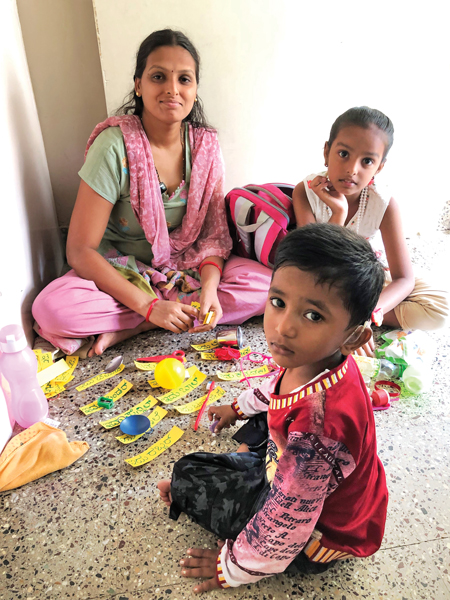
But it all boils down to early detection of the impairment and immediate action to ensure that the child gets adequate training for integration into a general school. But sadly, there is a huge dearth of knowledge and lack of training facilities to train such special children at the earliest and bring them into mainstream education.
Ruing the lack of awareness levels in India among parents to address hearing deficiency in their children, DG Mathew says, “Add to this the inadequate number of training centres to handle such children so that they can quickly be integrated into normal schools, the potential of these children remains untapped, and they lose opportunities for gainful employment.”
The genesis
Let’s wind back the clock by some 40 years and look into the life of Raja, the son of Wing Commander K K Srinivasan, who had a hearing disability from birth. To help his son Raja, Srinivasan resigned from the Indian Air Force and began the process of educating Raja in the Woodford Aural Method at Bala Vidyalaya, a school for the hearing- impaired in Chennai.
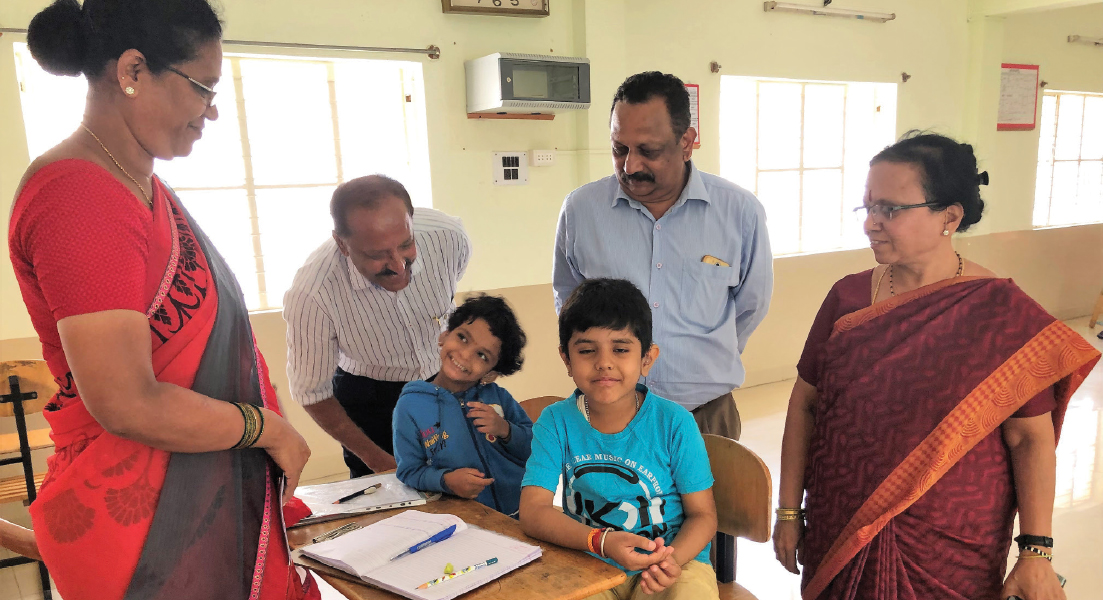
Srinivasan and his wife gave total attention to the training of their son and subsequently moved to Mysuru, where they set up a preschool for the benefit of other hearing-impaired children, on the first floor of their own house. This was in 1980, the International Year of the Handicapped. Initially the school had five deaf children, and all of them came with their mothers.
Says Parimala: “Mother plays a very important role in training the hearing and speech of a child because the child has learnt to recognise her voice right from the womb.”
At this preschool run by the Parents Association of Deaf Children, as the numbers increased, the association appealed to the local urban development authority for land and got allotted an acre of land at Bogadi, Mysuru. Funds were then raised to build a school which was named Institute of Mother and Deaf Child.
A partnership begins
Wesley adds that various philanthropic individuals and organisations such as Jindal, Jain Samaj, State Bank of India and Rotary contributed for the construction of the school and hostel buildings, equipment and setting up a library. In 1995, Rotary Club of Mysore West got inspired by the good work done by this institute and joined hands with the Parents Association of Deaf Children and thus was born a great partnership and the Rotary Mysore West Institute for Mother and Deaf Child came into being.
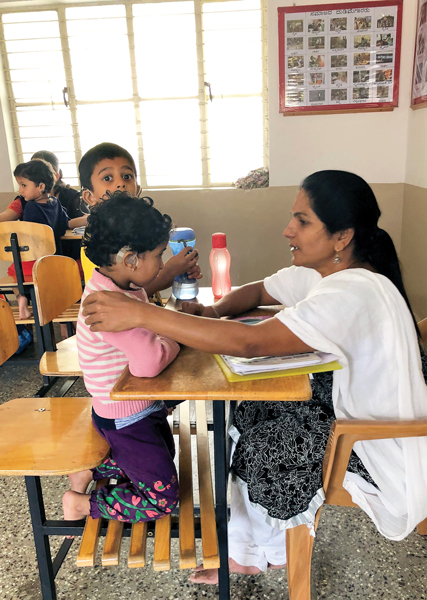
This is a residential facility which encourages children to be brought here at a younger age — ideally below three years — and “the mothers have to compulsorily attend the school with their children daily. We believe that the mother is the main teacher, as the child is more attached both physically and emotionally to her. She plays a very crucial role in the overall development of the hearing-impaired child,” he adds.
All the children here are fitted with cochlear implants; “this is very expensive running into lakhs of rupees, but now various government schemes are available and we give parents the details and tell them how to benefit from these schemes,” says Parimala.
Is there discrimination in the gender of the child who is brought here for special training, with sons being preferred over daughters? She smiles and says, “No, we don’t see any such discrimination; in fact, we have more girls here!”
My daughter stayed in Chennai alone as a paying guest. When trained properly, these youngsters can be really independent.
– Jalaja, a trustee
Methodology
Usually the child is trained in his/her mother tongue first; and at the outset the mothers are trained how to make their children listen, lip-read, with the training material using a lot of colourful images to stimulate the child’s learning. As the child makes progress, his/her reasoning and analytical abilities are improved through activity-based lessons.
The mother herself is trained by a group of counsellors whose children benefitted from this facility and who have volunteered their services. The ultimate objective is smooth integration of the child from this institution to a general school. The process takes from three to four years. But the results are great. Most of the children, after undergoing training here for three or four years go to regular schools, with many graduating from colleges and getting good jobs.
The first student
Technically, Srinivasan’s son Raja was the first student here and he has done PhD in both law and computer science in the US. He is a perennial source of inspiration for other children. The story of how Parimala herself landed up in this institute as a mentor is interesting. Having dealt with a hearing-handicapped cousin herself and constantly experiencing his frustration, she was both intrigued and fascinated when she saw Bharat, a hearing-impaired child, studying with her own son in Class 1, in a mainstream Mysuru school.
“We had so much trouble in interacting with our cousin; often he would get angry and we were not able to understand his anger and his difficulties. So when I saw Bharat in a normal school with my son, I got both excited and interested to know how this was possible.” She became friends with his mother Rathna Shetty, who is a trustee at this institute and started working here as a volunteer, and is now a full-time mentor at this institute.
As we watch the women interacting with the children — mothers and the children are often swapped for varied learning — she explains, “All the women/teachers you see here are parents.”
So are they special educators? “No, no, here we don’t see any degrees or training. As counsellors, we have only mothers who have trained their own children and integrated them in regular schools.”
Star students
Bharat, she adds, went on to do his MS in Florida and joined IBM through a campus interview. “Once we integrate these children into normal schools, they become like other students. They go for higher education, get good jobs, get married and have their own families. They are independent and most of them keep in touch with us and sometimes even donate money. Just before you came, two boys were here; one of them has got 93 per cent in Plus Two and is joining a good college.”
She says another student from Andhra Pradesh had called her recently to say that he had got a very good rank in JEE and was joining an IIT. Another three students recently joined tech major Wipro, after completing M Tech.
Most of this place was empty ground when Rotary joined this venture; we’ve constructed most of the buildings.
– DG Joseph Mathew
DG Joseph explains that as the children grow older their speech improves. “Once they go to mainstream schools and mix with their peers, when they find their speech is not understood fully, they strive to improve it so they can be understood easily.”
Chirpy and exuberant
We walk into the Kannada section at the institute to find each parent educating a child, not necessarily hers. As I try to talk to the children, take their pictures, and interview their mothers, little Rudran is rearing to grab my tape recorder. In fact, all the kids are most intrigued about the recorder; the mobile phone and camera they seem to be familiar with. Rudran wants to know whether I am taking pictures or a video on my mobile phone, and then wants to check out the pictures. He has to be “disciplined” by Namrata, who is teaching him. But her gentle chiding has little effect and he is all over the place, playing pranks on other children. The place is as lively and as noisy as you’d see any facility full of kids.
Parimala introduces me to Vijaya, a counsellor — this centre has 14 counsellors — whose daughter Kavita went through speech training here, went on to a regular school and then qualified as a chartered accountant and is now working in Wipro. “She got a girl baby last year,” says the mother proudly.
Mathew explains that of the 12 trustees here, six are from Rotary and the other six are parents. Jalaja, a trustee, is a veteran mother; her daughter Tanuja went through training here and is now married. “She is 29 now; we found out that she had a hearing deficiency when she was less than two, but at that time we did not know about this centre. So I brought her here only when she was five. Both of us stayed here for four years and my daughter benefitted from the training and went on to a regular school. She got a BCA degree, and was first working in Bengaluru and then Chennai in the IT industry, but resigned after marriage,” says Jalaja, adding proudly, “she stayed in Chennai alone as a paying guest and managed on her own. When trained properly, these youngsters can be really independent,” she says.
Parimala adds that when a mother first comes in with a child, she is trained by another mother or counsellor for at least three months before a child is entrusted to her.
Rotary millennium hostel
What the Rotarians and the parent organisation have managed to create together is commendable. The premises are spanking clean, and exude warmth and cheer with brightly painted and well-ventilated classrooms filled with colourful toys, charts and other fun learning material. The chairs for the children are specially made and are raised so that they can see the mother/teacher’s face. There is a hostel, which was the Rotary millennium year project for RC Mysore West, which accommodates 26 mothers and their children coming from a distance. Others have to organise rented accommodation near the place. In all there are 120 mothers with their children at this centre.
There is an audiology room for diagnosing and fitting hearing aids/cochlear implants. I am taken to a sound proof room which had been built to provide auditory verbal therapy, and the training imparted here to the children is of high quality indeed. The sound proof room is very important because once the child gets a cochlear implant, special training helps not only optimise maximum hearing, but also to experience varied sounds.
Wesley adds that the fee charged for the hostel accommodation and the training is nominal.
Over the years the funds required for the construction of classrooms, buildings, buying equipment and for recurring expenses have been raised from donors, philanthropists and Rotarians. “We have sustained this project over long years and so many matching grants have gone into this. Most of this place was empty ground when Rotary joined this venture; we’ve constructed most of the buildings,” smiles DG Mathew, adding “this particular wing where we are standing was inaugurated by PRIP Kalyan Banerjee in 1996.”
Namrata has been around here for seven months with her daughter Mitra, who is 4. “We found out about her hearing deficiency when she was over two years old, got her fitted with cochlear implants and she is now able to communicate,” says Namrata. She has two daughters, the elder one is now in Class 6 and has normal hearing.
Molina is here with her daughter Saloni; “we found out about her handicap a little after she turned one; we are from Udupi.”
The mother and child stay in the hostel and her husband, who works in Udupi takes care of the older daughter. Responding to my question, Molina says, “Yes, it is difficult to leave home and stay here, but I am doing it for Saloni’s future. If she is trained properly, she will be able to go to a regular school.”
Similarly, Revathi, who is from Hosur, has also left behind the rest of her family to be here. “Unfortunately, we don’t have such a training institute in Tamil Nadu,” she says.
Meanwhile, in the classroom, Namrata is asking Rudran:
Where does amma prepare chapatties?
In the kitchen.
What is the shape of the chapatties?
A circle.
Rudran answers her questions, though not at one go! He has enough distractions around him, including the visitors.
But day-after-day, he, along with the other children, is discovering the world of speech, which is slowly, but surely, unfolding before him.
Pictures by Rasheeda Bhagat

